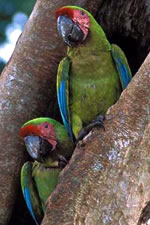From mongabay.com:
The decision last week by the Brazilian government to move forward on the $17 billion Belo Monte Dam on the Xingu river will set in motion a plan to build more than 100 dams across the Amazon basin, potentially turning tributaries of the world's largest river into 'an endless series of stagnant reservoirs', says a new short film released by Amazon Watch and International Rivers.
The film, narrated by Sigourney Weaver, uses a Google Earth 3-D tour to illustrate the potential impact of the dam. Belo Monte's reservoirs will flood 668 square kilometers, including parts of the city of Altamira, displacing more than 20,000 people. It will reduce the flow of the mighty Xingu to a trickle during parts of the year, reducing water supplies for downstream indigenous populations, blocking fish migration thereby disrupting local fisheries, and likely condemning several aquatic species to extinction. Flooding of forest areas will generate massive amounts of methane, a greenhouse gas 25 times more potent that CO2, and increase the risk of malaria in surrounding areas. Furthermore, if earlier dam projects in the Amazon are any model, Belo Monte will contribute to large-scale deforestation by local people who can no longer earn income from fishing or traditional livelihoods. Electricity grids, transmission lines, and access roads will put further pressure on the rainforest.
Click here to continue reading.
Monday, September 20, 2010
Tuesday, September 7, 2010
NEW SPECIES DISCOVERED: The adorable titi monkey

From Conservation International News:
What’s adorable, furry and has never been seen before? Callicebus caquetensis, a new species of titi monkey discovered on a scientific expedition to the Colombian Amazon. Researchers from the National University of Colombia who discovered the new primate consider it to be critically endangered due to rapid loss of the forest where it lives and its small population.
Titi monkeys (or zogui zogui as they are called in Spanish) have one of the most complex calls in the animal kingdom and use it every morning to mark their territory.
"This discovery is particularly important because it reminds us that we should celebrate the diversity of earth but also we must take action now to preserve it," said José Vicente Rodríguez, head of science at Conservation International in Colombia and president of the Colombia Association of Zoology.
Subscribe to:
Posts (Atom)





